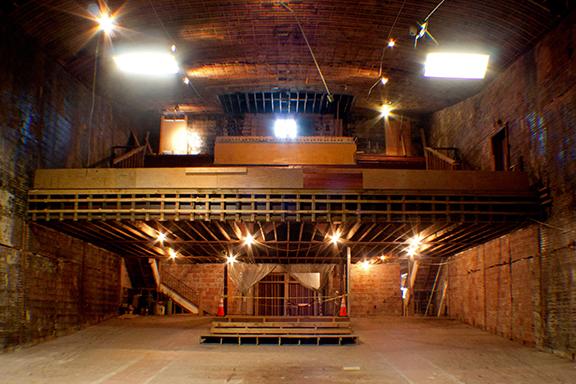
The community theater organization Appalachian Theatre of the High Country has acquired the historic Appalachian Twin Theater and plans to restore its original 1938 art-deco appearance and structure.
The organization, which strives to strengthen the Appalachian region’s theatrical culture, reimbursed the town of Boone for $624,500 in July.
This move comes after a series of back-and-forth negotiations between the organization and the town.
The project is still in the planning stages in terms of construction, but organizers are beginning to see their visions become a reality as the organization has come into “significant funds in the last couple of weeks,” ATHC Board of Trustees Chair John Cooper said.
The building was the home of a number of iterations of vaudeville, musical and cinematic theaters since its construction in 1938, but closed in 2007 when the Town of Boone purchased it. In 1950, a fire caused by a defective popcorn machine warranted renovation of the interior, which slowly deteriorated until its closing.
Cooper made personal attempts to purchase the theater and preserve its significance as a historic landmark in 2007, but he was outbid and the site was purchased by a local businessman for $1 million. After putting in $300,000 in deconstruction of the interior, however, the owners went bankrupt and the building was again up for reconsideration the following year, according to High Country Press.
“Given the recession, we actually got this building for a bargain,” Boone Town Council Member Lynne Mason said.
She saw the building’s potential as a bustling attraction that could build Boone’s downtown as part of the North Carolina Main Street program, which aims to restore the economic health of historic downtown areas.
“It was the perfect project to take on and make it happen,” Mason said.
It was never the town’s intention to hold possession of the theater in the long term, so when Cooper approached the town council with his ideas, Mason said she jumped at the opportunity.
“It took being creative, to be honest, because not everyone was as excited about it as I was,” Mason said.
Once the planning stages began, however, the town came out in support of the endeavor.
“There was a lot of excitement and interest,” Mason said. “It wasn’t just me that wanted it. It was the community.”
The project is still in the silent phase of fundraising, meaning officials are not revealing exact numbers or fundraising goals. So far, the organization has raised approximately 60 percent of its private sector goal in a relatively short amount of time.
“It’s going well,” Cooper said. “We’re very pleased with where we are.”
The building has been gutted and is still in need of everything that makes a theater operable.
“It’s like an artist working with a fresh canvas,” Cooper said.
The vast, empty space, which Cooper calls his “beautiful mess,” is littered with remains from the former lives of the theater: an old projection booth, burnt out light bulbs, labels on the walls where movie posters were once organized and burn marks on the walls from the fire.
Campaign organizers have conducted searches and interviews to find as much factual and anecdotal information as they can about the building’s original interior design. These uncovered facts have also contributed to an improved idea of Boone life was like in the 1930s.
Cooper’s favorite tidbit is the reasoning behind the 999 seats in the original theater: to avoid a 10-cent tax for 1,000 seats, which would have raised ticket prices from 25 to 35 cents.
The historic structure’s exposed support beams were even carried into town from Tennessee in the 1930s by the original Tweetsie Railroad.
Open house events are planned for Oct. 4 as well as for the theater’s 75th anniversary on Nov. 14. These events will feature live music and public information about the campaign, as well as public tours of the space.
Construction is intended to begin next summer, with the space open for public, private and Appalachian State University’s use the following summer.
Organizers are drawing up plans for the future of this town landmark.
“It was built in 1938 and it was built to last,” Cooper said. “It’s not going anywhere.”
STORY: LOVEY COOPER, Senior A&E Reporter
PHOTO: RACHEL KRAUZA, Intern Photographer

